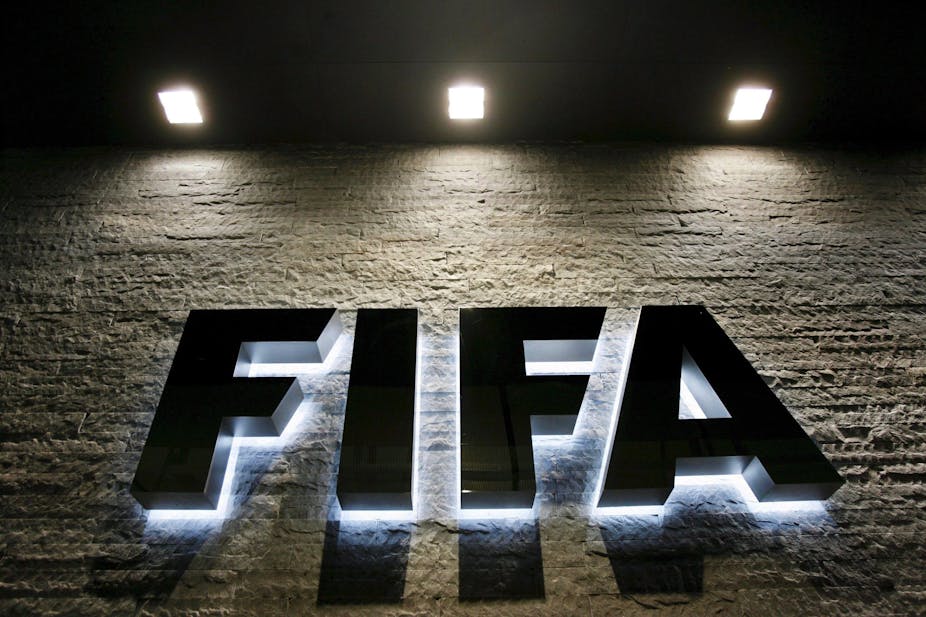The limited release of FIFA’s investigation into corruption allegations surrounding the awarding of the 2018 and 2022 FIFA World Cup was supposed to allay the ever-increasing perception that corruption pervaded the football’s governing body.
However, the scathing attack by its own chief investigator into the issue has achieved the opposite, and demonstrated that FIFA is itself either in cover-up mode or extremely delusional.
It’s pretty clear that there are global governance problems, so the question is how do we deal with them.
Case-study in corruption
Conditions encouraging corruption include a high level of discretionary power, large sums of money and weak detection and enforcement. The case of FIFA (and indeed many other governing bodies in sport) is almost a textbook example of the conditions under which corruption will flourish.
Organisations such as FIFA exert almost complete control over their sports, setting the rules, determining the voting mechanisms and deciding who plays. They also decide where events such as the World Cup are held. The fact there is no shortage of bidders generally leads to the economic gains from hosting being largely captured by FIFA itself. For instance, FIFA retains many of the revenues from marketing and broadcast rights but requires all infrastructure construction costs to be picked up by the host. Commentators estimated FIFA pocketed more than US$2 billion profit from the World Cup in Brazil.
Intense bidding is key. Whether perceiving it as offering economic or political gain, national governments are prepared to spend large amounts on bids with low probability of success. Moreover, they are prepared to then trade away many of the possible gains through tax exemptions for FIFA and by covering all costs.
This intense competition acts as a magnet to corrupt practice, exacerbated by the fact that the bidding process itself is very non-transparent. There is no set of definitive rules which seem to identify what a winning bid should look like.
The amounts spent on bids that are disclosed - such the $45 million spent by Australia in its unsuccessful bid against Qatar for the 2022 World Cup - do not capture the full costs of consultants employed, or “grants” made, such as the one from the Australian government to the FIFA Oceania region.
“We receive watches”
Moreover, there is a clear expectation of gifts of all kinds to be made to officials of FIFA. Recent revelations of the “watchgate” scandal, which concerned $US25,000 watches being handed to officials at the World Cup in Brazil was initially brushed aside by UEFA President Michel Platini as nothing out of the ordinary because “we receive many watches”. Such views may well demonstrate how entrenched corruption may become in organisations such as FIFA.
One constraint against corruption should be the apparent democratic structure of FIFA. In the FIFA Congress, each country receives one vote. Hence, in principle, even the smallest national association receives the same weight in decision-making as very large associations. In practice, however, these smaller nations could be easily bought off with money for facilities, allocation of minor FIFA events and the like.
Patronage can also be gained by allocating prized VIP tickets for desirable events (such as the 2014 FIFA World Cup final, which reportedly sold for around US$50,000). Politically, it is argued that this ensures that the President can safely maintain power. Indeed, challenges are rare – there have been only eight presidents of FIFA in its 100-year history (and only 2 since 1974).
Judging itself
In terms of enforcement, FIFA conducts its own investigations into corruption allegations itself. It also decides its own penalties. This is similar to the accused sitting in judgement on their own case. In any other setting, this would be unimaginable.
Change from within seems unlikely. Any internal challenge to the president, who seemingly controls sufficient evidence to bring corruption charges against insubordinate senior officials (such as occurred when Bin Hammam and former FIFA executive committee member Jack Warner mounted a challenge in 2011), is likely to fail.
So the impetus to tackle entrenched corruption must come from external forces, such as from governments contemplating taxpayer funded bids for FIFA World Cup events. Bidders must now not only consider the paucity of actual economic gains which flow their way, but the likelihood that they are not in a level playing field. The rational response for any honest bidder should be not to bid.
This will ultimately reduce the discretionary power that FIFA enjoys in the same way as was the case for the LA Olympic Games in 1984, when for a variety of political reasons, LA was the only bidder. Unsurprisingly, these were the last games estimated to have delivered a real economic gain to its host.
Hard to stamp out
Entrenched leadership characterises many sports. Formula 1 manufacturers are unwilling to challenge the power of Bernie Ecclestone. Power shifts are underway in international cricket (ICC) as large countries (in particular India) appear to be gaining a greater share of the pie, but these merely redistribute the rents achieved by governing bodies and don’t constitute a reform.
It seems certain that nations will continue to compete to host the World Cup. FIFA retains the right to allocate these prized hosting rights and the process remains non-transparent. Even when transgressions occur, they can be brushed aside using secrecy and internal review. In such circumstances, corruption will continue to flourish in FIFA. It is possible that the changes could come from the establishment of rival, breakaway leagues or from greater scrutiny over the bidding for events by nations. However, at this point in time, neither appears likely.
John Wilson’s book, Public Policy and Professional Sports: International and Australian Experiences (co-authored with Richard Pomfret),is published by Edward Elgar.

